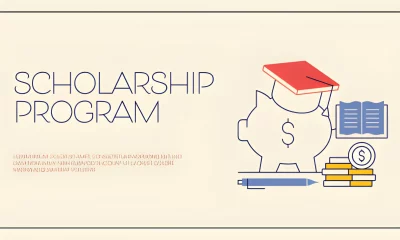Canada Scholarship
How to Study in Canada Without IELTS, GMAT, GRE or TOEFL
While it might seem challenging to study in Canada without IELTS, GMAT, GRE, or TOEFL, it is indeed possible.
Study in Canada Without IELTS, GMAT, GRE or TOEFL – For many international students, one major hurdle to studying abroad is passing standardized tests like the IELTS, GMAT, GRE, or TOEFL. Fortunately, there are ways to study in Canada without these exams.
The prospect might seem too good to be true, but let’s buckle up and dive deep into this exciting possibility!
Related: What is IELTS? Definition, Types and How it Works
How to Study in Canada Without IELTS, GMAT, GRE or TOEFL
Canada is a popular destination for students worldwide, known for its high-quality education, diverse culture, and excellent standard of living.
It attracts hundreds of thousands of students each year from different countries.
The assumption that standardized tests are a necessity for studying abroad is common but not entirely accurate.
There are several pathways to study in Canada that do not require IELTS, GMAT, GRE, or TOEFL.
1. Apply for Admission in Canadian Universities that do not require IELTS, GMAT, GRE or TOEFL
Not all universities in Canada require standardized tests. Some universities, especially those in French-speaking regions, may have different language proficiency requirements.
Other Canadian universities may waive the IELTS/TOEFL requirement if you have completed a degree in English or studied in an English-speaking school, while some may even accept a certificate from your previous institution stating that your medium of instruction was English.
Universities such as the University of Winnipeg, Brock University, and others have such provisions.
Familiarize yourself with the admission policies of your preferred institutions before applying.
2. Intensive English/French Programs
Many universities in Canada offer intensive English or French programs. Students enrolled in these programs are taught language skills in addition to their regular courses. Upon successful completion, students are often allowed to continue their education without needing standardized tests.
3. Pathway Programs
Pathway programs are preparatory courses that help international students adapt to the Canadian academic environment.
These programs provide a bridge for students who want to study in Canada but don’t meet the traditional requirements.
They usually involve a preparatory course that, once completed, allows students to progress to a full degree course.
They can be an excellent route for those avoiding standardized tests.
4. Other accepted English language proficiency proofs
Other than IELTS and TOEFL, Canadian universities may accept CAEL, PTE, or evidence of having studied in an English-medium school as proof of English proficiency.
See this: Total Educational Cost to Study in Canada | Complete Student Guide
List of Canadian Universities that Do Not Require IELTS, GMAT, GRE, or TOEFL
Choosing the right university is crucial when planning to study in Canada without IELTS, GMAT, GRE, or TOEFL. Here are some universities that might accept students without these tests.
1. University of Saskatchewan
This university offers the English for Academic Purposes (EAP) program, which students can take instead of providing IELTS or TOEFL scores.
2. University of Winnipeg
The University of Winnipeg allows students to study without IELTS, GMAT, GRE, or TOEFL if they’ve completed the Academic English Program for University and College Entrance (AEPUCE).
3. Memorial University of Newfoundland
At the Memorial University of Newfoundland, students can enroll without IELTS or TOEFL if they have completed an Intensive English Program at an accepted institution.
4. Carleton University
Carleton University admits students who’ve completed a year of university in English or have graduated from an English-speaking high school.
5. Concordia University
Concordia accepts students who have studied in an English-speaking institution or have attended schools in certain countries.
Key Takeaways
- It’s possible to study in Canada without needing to pass standardized tests like the IELTS, GMAT, GRE, or TOEFL.
- Not all Canadian universities require these standardized tests. Many, especially in French-speaking regions, may have different language proficiency requirements.
- Universities may waive the IELTS/TOEFL requirement if you’ve completed a degree in English or studied in an English-speaking school.
- Some universities may accept a certificate stating your medium of instruction was English.
- Universities often offer intensive English or French programs that, upon successful completion, allow students to continue their education without the need for standardized tests.
- Canadian universities may accept CAEL, PTE, or proof of studying in an English-medium school as alternative English proficiency evidence.
FAQs about Studying in Canada without IELTS, GMAT, GRE, or TOEFL
[accordions title=”Study in Canada Without IELTS, GMAT, GRE or TOEFL FAQs”] [accordion title=”1. Can I apply to all programs in Canadian Universities without standardized tests?” load=”show”]Not necessarily. Some programs may still require these tests, so it’s essential to check the specific program requirements.[/accordion] [accordion title=”2. Will studying through a Pathway Program or Intensive Language Program extend my graduation time?” load=”hide”]It might, depending on the program and your language proficiency level. However, these programs can also provide a strong language foundation that will help you succeed in your studies.[/accordion] [accordion title=”3. Is studying in Canada without these tests less beneficial in terms of future prospects?” load=”hide”]Not at all! Your skills, knowledge, and performance during your studies matter more than the path you took to get there.[/accordion] [accordion title=”4. Can I apply for scholarships without standardized test scores?” load=”hide”]Yes, there are many scholarships that do not require standardized test scores. However, eligibility can vary depending on the specific scholarship.[/accordion] [accordion title=”5. Is studying in an English-speaking institution enough proof of language proficiency?” load=”hide”]It depends on the institution in Canada. While some may accept this as proof, others might not.[/accordion] [accordion title=”6. Are there alternative tests that I can take instead of IELTS, GMAT, GRE, or TOEFL?” load=”hide”]Yes, some universities may accept other tests such as the PTE (Pearson Test of English) or the CAEL (Canadian Academic English Language) test.[/accordion] [accordion title=”7. Can I study in Canada without IELTS, GMAT, GRE, or TOEFL?” load=”hide”]Yes, there are universities and programs in Canada that accept students without these tests.[/accordion] [accordion title=”8. What can I use as proof of English proficiency instead of IELTS or TOEFL?” load=”hide”]Evidence of having studied in an English-medium school or results from PTE or CAEL tests can be used.[/accordion] [accordion title=”9. What are pathway programs?” load=”hide”]Pathway programs are preparatory courses designed to help international students adapt to the Canadian academic environment.[/accordion] [accordion title=”10. How can I strengthen my application without these test scores?” load=”hide”]Emphasize your academic achievements, extracurricular activities, recommendation letters, and write a strong personal statement.[/accordion] [accordion title=”11. Are there disadvantages to studying in Canada without these tests?” load=”hide”]Not all universities accept students without these tests, which can limit your options. These tests can also strengthen your application for competitive programs.[/accordion] [accordion title=”12. What is the minimum IELTS score required to study in Canada?” load=”hide”]A minimum IELTS score may be required to study in Canada, depending on the institution and program to which you are applying. In general, programs require at least a 6.5 overall score and a 6.0 in each of the four IELTS components (Reading, Writing, Speaking, and Listening). Some colleges may require higher marks, particularly for graduate programs. It is essential to discuss the minimum IELTS score requirements with the specific university you are interested in. Also, keep in mind that obtaining a visa or study permit in Canada may necessitate a passing score on an authorized language test.[/accordion] [/accordions]
Study in Canada Without IELTS, GMAT, GRE or TOEFL – Conclusion
While it might seem challenging to study in Canada without IELTS, GMAT, GRE, or TOEFL, it is indeed possible. By focusing on strengthening other areas of your application, choosing universities that do not require these tests, or completing a pathway program, you can open the door to the numerous opportunities that studying in Canada offers.
See what others are reading:
- Best Canadian Universities for medical Students (Complete List)
- Study in Canada Visa Requirements: A Comprehensive Guide


















